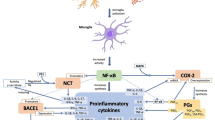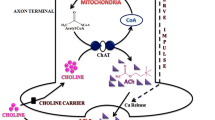Abstract.
Deposition of amyloid β-protein (Aβ) in the brain is an early and invariant neuropathological feature of Alzheimer’s disease (AD). The current search for anti-AD drugs is mainly focused on modification of the process of accumulation of Aβ in the brain. Here, we review four anti-amyloidogenic strategies: (i) reduction of Aβ production, which has mainly been approached with secretase inhibition, (ii) promotion of the Aβ degrading catabolic pathway, including an Aβ degrading enzyme, neprilysin, (iii) immunotherapy for Aβ and (iv) inhibition of Aβ aggregation. We have reported that AD patients have a favorable molecular environment for Aβ aggregation and that various compounds, such as polyphenols, interfere with Aβ aggregation and destabilize preformed Aβ fibrils.
Similar content being viewed by others
Author information
Authors and Affiliations
Corresponding author
Additional information
Received 21 December 2005; received after revision 14 February 2006; accepted 29 March 2006
Rights and permissions
About this article
Cite this article
Hamaguchi, T., Ono, K. & Yamada, M. Anti-amyloidogenic therapies: strategies for prevention and treatment of Alzheimer’s disease. Cell. Mol. Life Sci. 63, 1538–1552 (2006). https://doi.org/10.1007/s00018-005-5599-9
Published:
Issue Date:
DOI: https://doi.org/10.1007/s00018-005-5599-9




